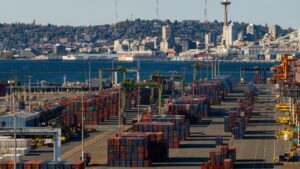The Hidden Cost of Tariffs: How Policies Impact Everyday Americans
Welcome to Extreme Investor Network, where we dive deep into personal finance topics that affect your wallet and financial future. Today, we’re unpacking a crucial yet often overlooked aspect of economic policy: tariffs. While these taxes on imported goods may seem like a distant political issue, their implications reach right into our homes, affecting the budgets of everyday Americans.
What Are Tariffs and Why Should You Care?
Tariffs are essentially taxes that the government imposes on imported goods, designed to protect domestic industries by making foreign products more expensive. However, this protection comes at a cost. As businesses adapt to price increases due to tariffs, consumers can expect to pay more for everyday items. A recent analysis by the Institute on Taxation and Economic Policy (ITEP) reveals just how sharply this burden falls, particularly on lower-income households.
The Disproportionate Impact on Low-Income Households
Let’s break this down with some eye-opening statistics. According to ITEP, if current tariff policies remain in place through 2026, the lowest 20% of households—those earning less than $29,000—will face a tax increase equivalent to a staggering 6.2% of their annual income. In contrast, the top 1% of earners, making over $915,000 a year, would see their tax burden rise by only 1.7%.
Why is this significant? Lower-income families tend to allocate a larger portion of their budgets to essentials like food and clothing, which are directly affected by tariffs. This means that these families will feel the pinch of rising prices disproportionately, potentially harming their quality of life and financial stability.
Tariffs: Taxation by Another Name
Experts have pointed out that tariffs act as "taxes on Americans by another name." The Heritage Foundation argues that reducing these tariffs could represent a substantial tax cut for low-income families, hinting at the possibility of easing the financial strain on those most affected.
While some policymakers, including Treasury Secretary Scott Bessent, suggest that tariffs may only result in a "one-time price adjustment," the reality is that the long-term effects can be more damaging, particularly for those already struggling to make ends meet.
The Economic Ripple Effect
Interestingly, heightened costs driven by tariffs don’t just affect the consumers; they can also lead to broader economic challenges. Retailers may respond to tariff-induced price increases by adjusting their marketing and inventory strategies, which can disrupt local economies and job markets.
As a savvy consumer, understanding these economic undercurrents allows you to make informed decisions about your purchases and investments. Paying attention to pricing trends linked to tariffs can lead to better budgeting and financial planning strategies in your household.
What’s Next? Potential Changes on the Horizon
While tariff policies can seem static, change is possible. The current administration hints at re-evaluating relationships with trading partners, contemplating exemptions for specific products, and even enacting tax relief measures alongside tariff adjustments. Staying informed about these developments gives you a critical edge in your personal finance strategy.
Take Control of Your Financial Future
At Extreme Investor Network, we believe that knowledge is power. By understanding the implications of government policies, like tariffs, you can better prepare your finances for the future. Consider reviewing your budget to see where you might be affected by increasing prices and explore alternatives to high-cost items.
In summary, tariffs impact each of us differently. For those at the lower end of the income spectrum, the financial burden can be significant. Empower yourself with information from credible sources and adapt your strategies accordingly. Want more insights that can help you navigate the complex world of personal finance? Stay tuned to Extreme Investor Network for the latest updates and practical advice tailored just for you!
Remember, the road to financial wellness starts with informed decisions. Join us on this journey.

